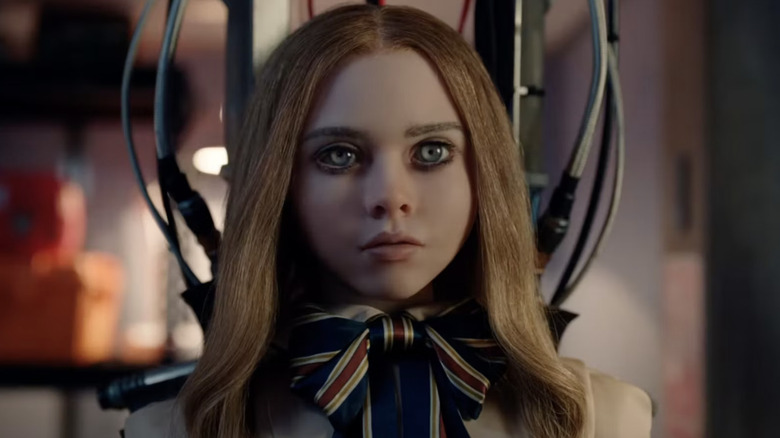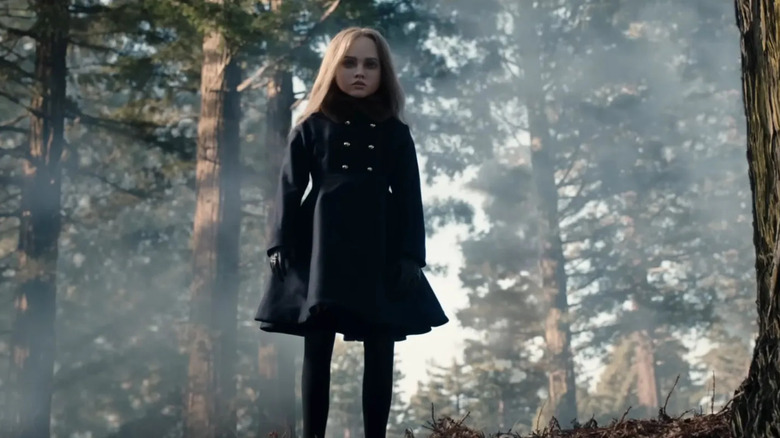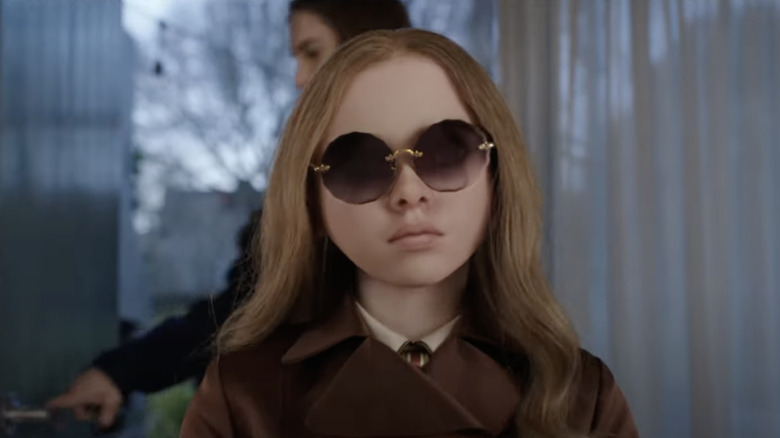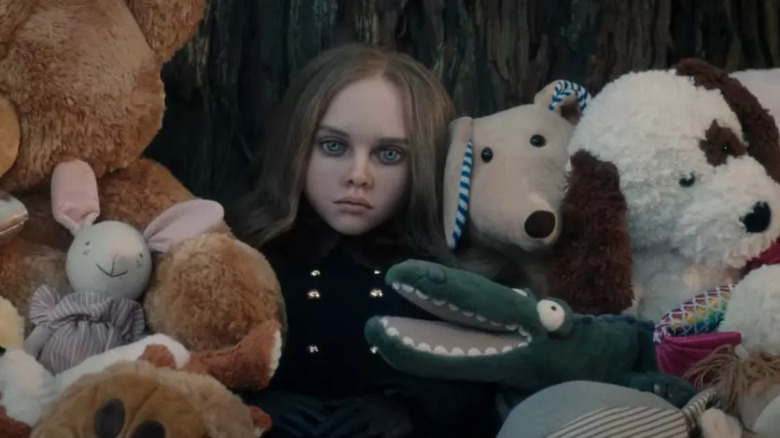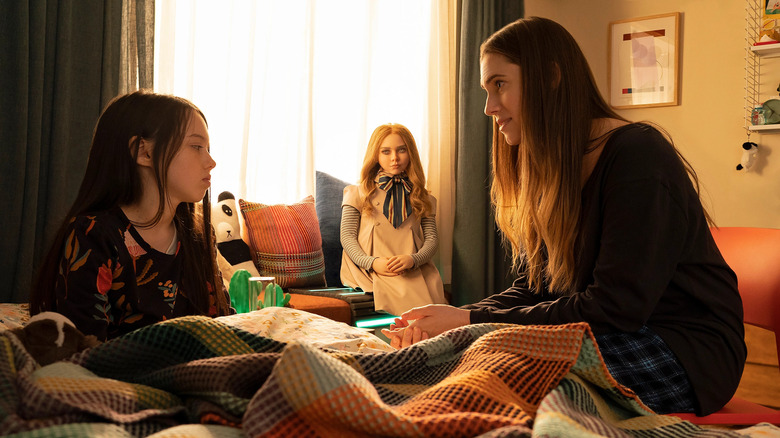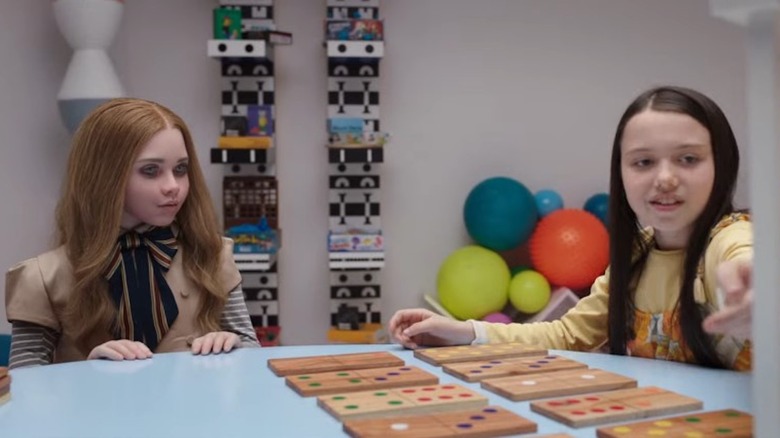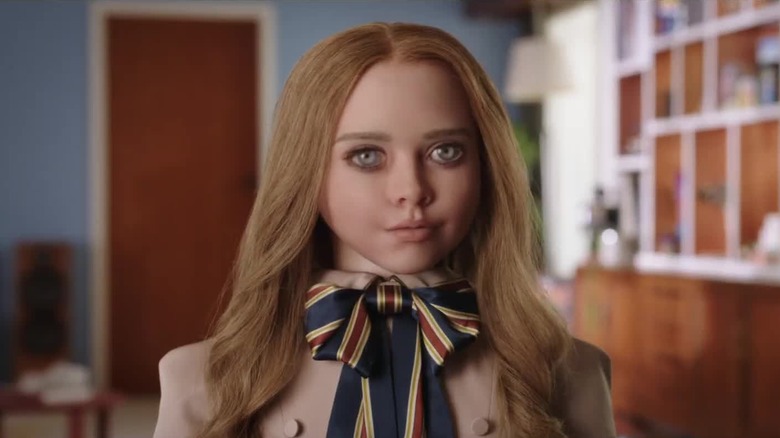M3GAN Director Gerard Johnstone On How To Balance Comedy With Creepiness [Exclusive Interview]
This post contains mild spoilers for "M3GAN."
Gerard Johnstone may not have the same name recognition as other members of the "M3GAN" creative team, like producer James Wan or star Allison Williams, but the New Zealand director is a favorite of fans of horror comedies, thanks to his 2014 debut feature, "Housebound." Although he's been directing shows like "Terry Teo" and "The New Legends of Monkey," Johnstone is making his highly-anticipated return to horror features with the Blumhouse killer doll flick that the world can't stop talking about. As /Film's Jeff Ewing said in his review of the film, "M3GAN" is a "thoroughly enjoyable blast of a film from the first frame to last, demanding to be seen in a packed theater of eager viewers."
The horror movie gods smiled upon me and blessed me with the opportunity to talk to Johnstone ahead of the theatrical arrival of "M3GAN," to figure out how he got so good at navigating the tone of horror comedies, the secret heart of this bonkers movie, how parenthood has influenced his work, and whether or not M3GAN would beat the titular "The Boy" in a fight.
Note: This interview has been lightly edited for clarity and brevity.
Here's why we haven't seen a Gerard Johnstone feature since Housebound
What was it about the story of "M3GAN" that drew you to the project?
Well, we are living in a time where people are living and working with technology, and it's just so pervasive and you just can't get away from it. As a new parent, I was just constantly plagued by how reliant we are on these things and how much time we're supposed to be — whether or not this is something we should be protecting our children from. And "M3GAN" is really an allegory about parenting in the 21st century. So it was hugely appealing to me in that regard, and it was a chance to put a lot of my own anxieties onto the screen.
Is parenthood the reason that we haven't seen a feature from you since "Housebound?"
Pretty much. It's that thing of the work-life balance. It's really tough, especially when you're writing, because it's not like a job where you can go to and something gets done at the end of the day. It might be a day when nothing really happens and you're feeling really guilty about that, but you're also feeling guilty about the time that you've been away from your child. There's not a lot of books about how to manage that. But after "Housebound," my first boy was two, and then my second one was born just when it came out. So I've been doing that the whole time.
The difference between indie filmmaking and studio pictures
I've been wondering, because when "Housebound" came out, it was one of my favorites of the year. Rewatching in quarantine was an interesting experience. So it was exciting when it was announced that you were directing "M3GAN," because I think fans were like, "Oh, one of our faves is getting a bigger platform," which is exciting. But you wrote, directed, and edited "Housebound," and now you are directing someone else's material. Has that changed your process as a director?
It's definitely something that takes a little getting used to, because, on an indie feature, you're so autonomous. But on this one, there was definitely nothing stopping me. The good thing about ultimately being in charge is that if you have an idea or something you want to enact, everyone just wants to see your vision of the movie. And if that includes putting in a new idea and changing something, then you can do it. You kind of do have to do it by committee, because it's not your money. So that was a learning curve, figuring out how to do that.
But you're always, even if you're making a low budget maybe with grant money or invested money, you're still feeling like a responsibility to everyone who's put their money into this and wants to see a profit from it. But working with an editor on this was a lot of fun, really. It was actually fun to have someone to hang out with, because it could be quite a lonely place. So that was nice having Jeff [McEvoy], my editor on this, to spend time with and problem-solve with.
Balancing the silly with the scary
"M3GAN" is also a very specific tone of horror comedy, one that just checks all of my boxes. So thank you for setting the bar for 2023 horror. How do you find a way to balance the silly with the scary?
It really comes down to what you yourself would like. I think a long time ago, I realized that this process of making things works so much better if you, yourself, are the audience. So it just comes down to what I would like to see in the movie. And if I would like to see something that's played a little bit straighter, then I really work hard on that, making sure that the tone is very specific. But sometimes I just want to let loose and have some fun and do something that's really bonkers, like have her dance down a corridor to whatever soundtrack's playing. And in those moments, if I'm genuinely excited and I can just feel myself judging a scene or an idea, I just have to follow that instinct. And so it really is kind of a gut thing, I think.
Speaking of the dance, was that something you had to sell people on, or was everyone on board with the dance?
Strangely, I think everyone was on board from the get-go. You get a lot of notes about story things and, "Will this makes sense?" and "How are we going to do this?" But the dance, weirdly, stayed under the radar for a long time. I think everyone just thought it was a really fun, exciting, new idea. And by then, they were already having so much fun with her character that it just felt like the natural next place to take it.
A lesson in directing robots
As a director, how do you go about having a lead character that is a robot doll? Does that change your process of how to direct the humans in the scene?
Yeah, it is hard, but I think it's hardest for the other actors, because she requires so much focus and so much concentration. One hair of M3GAN's head can't be loose. She's got to be perfect, but it's not an exact science. There are so many things that go into her face. She's this really complicated animatronic creation that requires everything to be so specific. So I think it was a real challenge for the other actors to just constantly have to be engaging with another actor as well that you can't talk to and say, "So what are you going to do in this scene? How are you thinking about taking it?" It's like M3GAN's a whole army of people that goes into making her. So it's a challenge. But Allison [Williams] was just a pro about it, and I didn't realize how difficult it was for her until long after the movie because she doesn't like to complain. She doesn't ever want to pull focus to her.
Above all else, "M3GAN" is also just such a fun movie. What are some horror movies that you find to be fun?
I'm a big fan of Sam Raimi, "Drag Me to Hell" and "The Evil Dead" trilogy — those movies that combine horror and comedy. And the Coen Brothers as well — just a very dry tone, but you can tell they're secretly making comedies. They're secretly making each other laugh, but doing it in a very deadpan way. And Wes Craven is a big influence on me, for sure. And obviously, Edgar Wright and Simon Pegg. My big lesson from them when I first watched "Shaun of the Dead" and it just completely blew my mind, was just how seriously they took both genres. So that's something that I realized when I was making "Housebound" that I had to do right. If I was going to do this, I had to treat the horror as seriously as I did the comedy.
'Have we earned the right to say this?'
I think that you have found a way to find a really good balance with both "Housebound" and now with "M3GAN," because as much as "M3GAN" is about a murderous robot doll, it's also about childhood trauma. It's also about being thrown into a parental role that you may not be prepared for. So how did you find a way to navigate those more serious elements?
The best art is always when people are putting as much of themselves into it and being honest about things that are really uncomfortable to talk about — like my own failings as a parent, I just decided to put them front and center on the screen almost as a way for me to acknowledge them and then figure out how to deal with them. It's so important that a movie has heart and there's a point to it, but it's also really important that you earn it. So I remember there being a lot of conversations with Allison [Williams], because she's the one that's having to do this. I can easily suggest something to her, but ultimately she's the one that has to pull it off. So she was really great about just checking, "Have we earned the right to say this?" And we had a lot of conversations and it really only came through, actually, some quite fortuitous limitations in the story in terms of the production where we had to change certain things that earned various things better. I think the arc of [Cady] was something that really came out last minute. You really weren't sure who [Cady] was going to side with. Is her character going to side with M3GAN or Gemma? It's really a process of exploration.
The pressure for success is on
The presentation scene is where Violet [McGraw] as Cady really does get to shine. It's so heartfelt. I like that you mentioned the heart, because I think "Housebound" also has a lot of heart, so it's nice to have this little connective tissue between these two movies. But on a lighter note, what was your reaction like when the trailer dropped and the internet just lost their collective minds about it?
I just felt like I just completely lucked out. And the internet being what it is, it's mainly a place of hate. [laughs] So to have this outpouring of love and people not only love it, but say, "If anyone else tries to say s*** about my girl, I'm going to be the first in line to defend her," that was really cool. I think it was really cool to see people embrace her, and I just felt like, "This is not normal. This probably won't happen again. So enjoy it while it lasts."
I told James Wan earlier that I went to a Halloween party and someone showed up dressed like M3GAN, and the second she arrived, everyone wanted to take pictures with her. It was fantastic. But I think you're right. The internet is — I mean, I'm a queer woman who talks about film. I'm fully aware of how evil the internet is. They're all in my inbox. But this is such a celebrated collective moment, and we haven't had that in horror in a while. This is now going to be a collective shared experience. How does that make you feel as a director, knowing that your movie is going to be responsible for probably one of the event horror films of the year?
Oh my God. It makes me want to crawl into a small dark space. [laughs] I'm not quite sure I'm prepared for that. I think if I can make something that brings joy to people, that's always great. And if I can make them think about technology, that's great. And if I can be the shepherd of a film that has three really strong female leads, great. But it's certainly not something I'm ever thinking about. When I made "Housebound," again, it was like two strong female leads. It was just something I'm not really aware of. So I try not to factor that in and I think the end results are better because it doesn't feel politically motivated. It is what it is.
I have one final question while we're wrapping up, and this is just a personal thought for me. So when "The Boy" came out, I was like, "Hmm, this is really similar to 'Housebound.'" So who would win in a fight? M3GAN or The Boy?
Oh my God. Well, M3GAN would rip him to shreds. Almost like a warning for anyone else to come near "Housebound" again. No, I mean, I haven't seen "The Boy," but yeah.
Eerily similar. I will say that much.
[laughs]
"M3GAN" is now playing in theaters.
